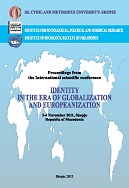THE DEVELOPMENT OF IDENTITIES AMONG THE MUSLIM POPULATION IN THE BALKANS IN AN ERA OF GLOBALIZATION AND EUROPEANIZATION: CASES OF TORBESHI, GORANI
THE DEVELOPMENT OF IDENTITIES AMONG THE MUSLIM POPULATION IN THE BALKANS IN AN ERA OF GLOBALIZATION AND EUROPEANIZATION: CASES OF TORBESHI, GORANI
Author(s): Rubin ZemonSubject(s): Anthropology
Published by: Институт за социолошки и политичко-правни истражувања
Keywords: Ethnic identity; Muslims; national revival
Summary/Abstract: During the Ottoman Empire as a theocratic state, ethnic identities and the ethnic belonging of people were not important vs. the religious identity and determination. The ethnic identity lost its importance in the Ottoman Empire and religious identity was given priority with the aim that all Muslim people belong to one Muslim community. At the end of the XXVIII and beginning of the XIX centuries, the process of the development of modern nations began among the various nationalities in the Balkans. The millet system, with its classification based on religion, became increasingly less viable. A process known as the National Revival was and is much more intensive among the Christian population than among the Muslims. The processes of development and construction of national identities in the Balkan states mainly follow the primordial way, which as a consequence has social antagonisms on a religious base among the people, presented as ethnic conflicts. The development of identities among the Muslims in the Balkan states at the end of the XX and beginning of XXI century is an issue that has very deep social, cultural, economic and political consequences and in various Balkan states we could see various context, circumstances, state strategies and polices. Ethnic and national identities among Muslims in the Balkans are very changeable.
Journal: Proceedings from the International scientific conference
- Issue Year: 2012
- Issue No: 1
- Page Range: 329-338
- Page Count: 10
- Language: English
- Content File-PDF

